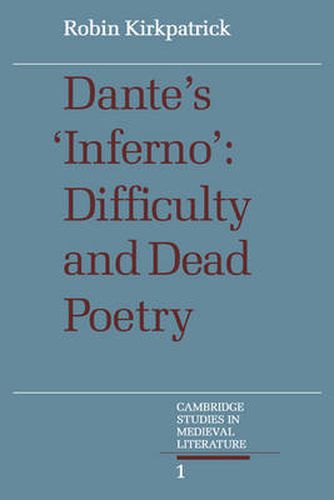Readings Newsletter
Become a Readings Member to make your shopping experience even easier.
Sign in or sign up for free!
You’re not far away from qualifying for FREE standard shipping within Australia
You’ve qualified for FREE standard shipping within Australia
The cart is loading…






This book represents a major re-assessment of Dante’s Inferno, and of the place which the Inferno occupies in the plan of the whole Commedia. On evidence drawn also from the Paradiso and Purgatorio, Dr Kirkpatrick argues that Dante’s thinking and poetry are subject to far greater internal tension than is commonly supposed. He then proceeds to analyse each of the thirty-four cantos of the Inferno, and to relate each canto in turn to its thematic and narrative context. Throughout, Dr Kirkpatrick is particularly concerned with features of language and structure which scholars have tended to overlook in emphasising the philosophical character of Dante’s poetry. And while he chooses, for the sake of clarity, to write in the accessible language of interpretative criticism, he continually stresses the extent to which advances in modern critical practice may usefully be brought to bear upon Dante’s writing.
$9.00 standard shipping within Australia
FREE standard shipping within Australia for orders over $100.00
Express & International shipping calculated at checkout
Stock availability can be subject to change without notice. We recommend calling the shop or contacting our online team to check availability of low stock items. Please see our Shopping Online page for more details.
This book represents a major re-assessment of Dante’s Inferno, and of the place which the Inferno occupies in the plan of the whole Commedia. On evidence drawn also from the Paradiso and Purgatorio, Dr Kirkpatrick argues that Dante’s thinking and poetry are subject to far greater internal tension than is commonly supposed. He then proceeds to analyse each of the thirty-four cantos of the Inferno, and to relate each canto in turn to its thematic and narrative context. Throughout, Dr Kirkpatrick is particularly concerned with features of language and structure which scholars have tended to overlook in emphasising the philosophical character of Dante’s poetry. And while he chooses, for the sake of clarity, to write in the accessible language of interpretative criticism, he continually stresses the extent to which advances in modern critical practice may usefully be brought to bear upon Dante’s writing.